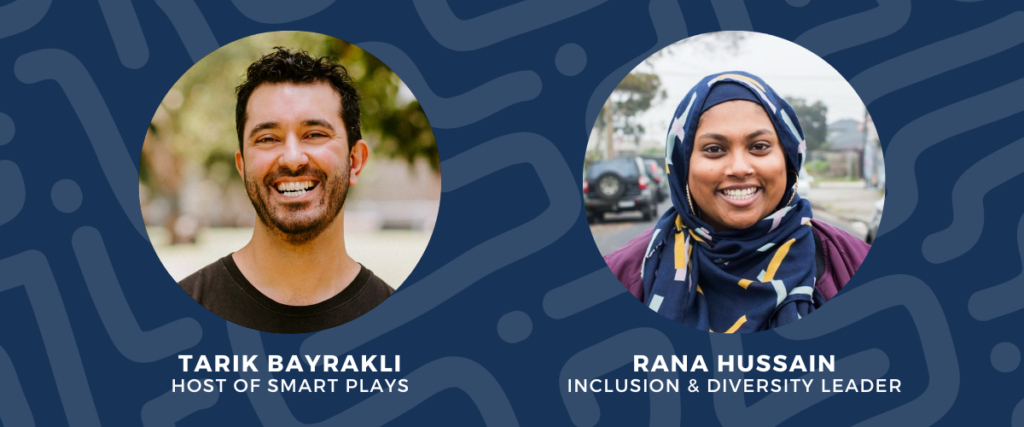Respecting and disagreeing
In each fortnightly episode of Smart Plays, Tarik and special guests will be tackling difficult social issues in sport and exploring our capacity for positive social change. In this episode, we chat with Rana Hussain about the modern challenges for clubs pursuing the inclusion of marginalised groups.
According to Rana, disagreement doesn’t have to equal disrespect and there are challenges for clubs that are confronted with different worldviews in the pursuit of diversity.
Listen on: Spotify | Apple Podcasts | Google Podcasts | Amazon | Others
Overview
Haneen Zreika and the Pride Round jumper. Netball Australia and Hancock Prospecting. FIFA Men’s World Cup and player activism. Athlete power is challenging the way sports are run. But what happens when inclusion in sport results in another group feeling excluded? How can we maintain respect for each other through the challenge of player or club advocacy?
Diversity Themed Rounds and team jumpers should be the tip of the iceberg, the reward for club community engagement and programs to ensure everyone feels welcome to their club or sport. However, that’s not always the case where clubs are keen to support marginalised groups without adequate consultation with existing club members or as a profit-making exercise.

Key takeaways
“We are arguing morality a lot of the time, and so when that’s the case, it becomes really positional and tribal and that can, as we’re seeing very quickly, becomes me against you at all costs. And I think it’s really hard now to put some of those beliefs aside, to just park them for the moment, and see the human in front of you.” – Rana Hussain
“What will happen there is that people who that doesn’t serve culturally or ideologically will self-select away, which might be fine. And because of our personal politics and ideology, we might be fine with that. My one caution there is that we’ve already been through that, which is why we have this work in the first place because prior to this, we had a dominant culture that meant people self-selected out. So I would caution any club with that, that as long as you’re comfortable with that and you understand that to a degree this work is exclusionary for some people. It’s up to you whether you’re okay with that kind of exclusion. Or if you are not, then you are gonna have to have this conversation around how do we hold everybody’s politics and make it work” – Rana Hussain
Here are some of the lessons learned throughout the episode:
- GWS Giants navigated the issue with Haneen Zreika and the Pride Round jumper really well, including a process around feedback and consultation with players. They navigated this really challenging moment as a team really well.
- Debates in this space are becoming positional and tribal and there is obviously emotion behind that.
- Clubs need to understand that advocating for specific groups is exclusionary for some people. But there are great examples where clubs have made it work.
- Club activism ultimately comes down to who your club wants to be and what it wants to stand by.
Notable moments
Short on time? Check out some of our favourite moments during this interview:
8:05 – Challenges for player and club activism
Rana’s argument is that we don’t all have to be the same and by working to find the middle we can keep moving forward, respectfully have these conversations, negotiate the nuances and finding ways to do things together.
19:32 – Themed rounds: are they doing more harm than good?
The visibility of marginalised people is an important part of making sport inclusive. The celebrations and advocacy in theme rounds needs to be matched with the hard work behind the scenes to make it happen and not go for the marketing quick-wins.
36:19 – Sponsors and influence
Advocacy in the USA is different from Australia. In the USA it’s often the players advocating and the club supporting the player’s advocacy. Whereas in Australia, the clubs and leagues lead the advocacy work.
Big sponsorship money means a club can ‘sit at the table’ and influence those major corporations (ie. what might have happened with Netball Australia and Hancock Prospecting). Sports and fans need to also consider what programs and initiatives within the sport need to be given up without up.
Links
We covered a lot in this episode! But, here are some notable links:
- In the episode, we spoke about Rana’s chat with Julia earlier in the year. Raw conversation and highly recommended: The Outer Sanctum, 5th Quarter | Rana Hussain and Julia Chiera
- Rana Hussain’s LinkedIn and Twitter.
Want to be in the know about all things Smart Plays?